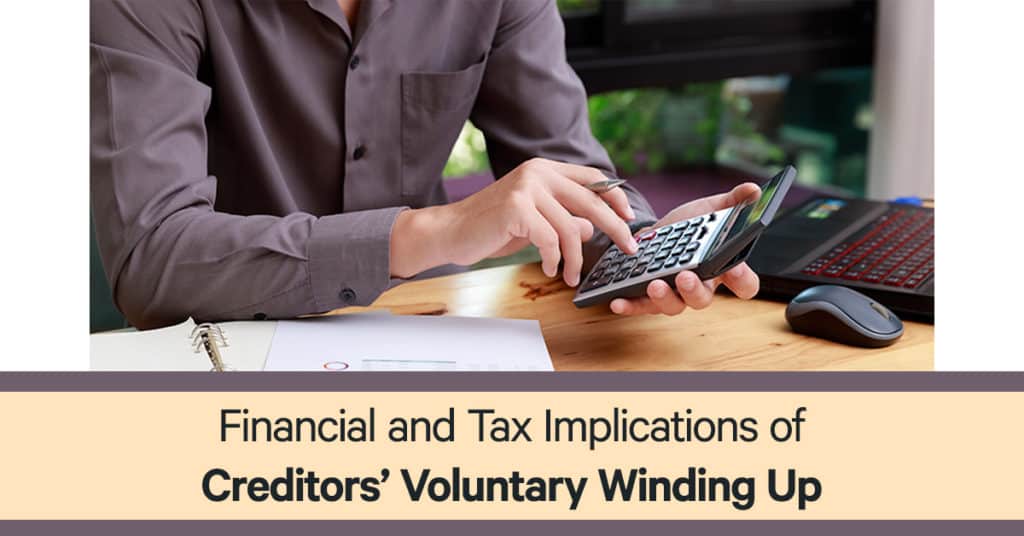In the corporate finance world, the decision to wind up a company is often a challenging yet necessary step, particularly when faced with insurmountable debts and operational difficulties. For UK businesses, the process known as Creditors’ Voluntary Winding Up (CVL) provides a structured and legally sound framework to manage the orderly closure of a company. This blog explores the financial and tax implications of Creditors’ Voluntary Winding Up, offering insights to help business owners navigate this complex terrain effectively.
Understanding Creditors’ Voluntary Winding Up (CVL)
Creditors’ Voluntary Winding Up is an insolvency procedure initiated by directors and facilitated through a formal meeting of the company’s creditors. This process is chosen when a company can no longer pay its debts as they fall due and directors believe the company has no viable future. Unlike compulsory winding up initiated by creditors through the court, CVL allows directors to maintain some control over the process and can mitigate potential legal actions against them, providing a structured and legally sanctioned path to wind up affairs responsibly.
Financial Considerations During CVL
One of the primary considerations during CVL is the realisation of company assets to settle outstanding debts to creditors. An appointed insolvency practitioner (IP) takes charge of liquidating the company’s assets, ensuring a fair distribution among creditors following statutory priorities. This process involves valuing assets, selling them at market value, and distributing proceeds in a prescribed order as per insolvency law.
Creditors’ Voluntary Winding Up provides a structured approach to managing debts and providing transparency in asset realisation and distribution. By voluntarily initiating the winding-up process, directors can demonstrate responsible corporate governance and seek to minimise potential personal liabilities.
Tax Implications of Creditors’ Voluntary Winding Up
From a tax perspective, CVL triggers several considerations for both the company and its stakeholders. Firstly, any gains or losses arising from the sale of assets during the liquidation process may have implications for capital gains tax (CGT). The appointed IP ensures all tax liabilities, including VAT and PAYE, are settled from the proceeds of asset realisation before distribution to creditors.
What’s more, for shareholders, the treatment of distributions received during CVL can have varying tax consequences depending on individual circumstances. Understanding these implications requires careful planning and advice from tax professionals to optimise tax efficiency and compliance with HMRC requirements.
Employee Implications and Redundancy Payments
During CVL, employee claims, such as redundancy payments and outstanding wages, hold priority status as preferential debts and have precedence in the distribution of the company’s assets. This makes sure that employees receive their entitlements before other creditors. The UK government’s Redundancy Payments Service (RPS) plays a key role in overseeing these payments, providing a vital safety net for employees affected by the company’s closure.
Directors shoulder a significant responsibility in managing these obligations carefully to comply with employment laws and avoid potential personal liabilities. By providing timely and accurate payments to employees, directors show their commitment to ethical business practices and avoid the risk of legal repercussions. Seeking guidance from experienced HR and legal professionals is essential for understanding the complexities of employment regulations during CVL, making sure that directors uphold their duties responsibly and support their employees through this challenging period.
The Role of Insolvency Practitioners in CVL
Insolvency practitioners (IPs) play an important and multifaceted role in overseeing the Creditors’ Voluntary Winding Up (CVL) process, acting as impartial arbiters and facilitators. They bring expertise not only in managing complex finances but also in handling the ins and outs of insolvency law.
From the outset, IPs carefully assess the company’s financial situation, working closely with directors to compile a thorough statement of affairs. This document forms the basis for the creditors’ meeting, where IPs guide proceedings and provide transparency in decision-making. Their role extends to managing the liquidation of assets, valuing them accurately, and conducting sales to realise maximum returns for creditors.
Throughout the CVL process, IPs maintain strict adherence to legal requirements, safeguarding the interests of all stakeholders involved. They act as mediators between creditors and directors, ensuring all parties are informed and consulted at every stage. Their ability to deal with complex financial landscapes and mitigate potential disputes provides reassurance to creditors and enhances the overall integrity of the winding-up process.
What’s more, IPs serve as educators, providing clarity on the rights and obligations of directors and creditors alike. Their impartial advice helps directors make informed decisions that align with legal frameworks, thereby minimising risks and liabilities.
A Practical Approach
In summary, Creditors’ Voluntary Winding Up (CVL) provides a clear and legally accepted way for companies dealing with serious financial issues to wrap things up. Understanding the financial and tax implications of CVL helps directors make smart choices that protect creditors’ interests and manage their own legal responsibilities.
By knowing the ins and outs of CVL, directors can handle the process confidently. They can sell off assets in a fair way, making sure creditors get what they’re owed while also following the law. This approach helps directors protect themselves from personal financial risks and shows their commitment to doing things right even in tough times, which is crucial for maintaining their reputation in the business world.
Overall, CVL gives directors the tools to take decisive steps when financial challenges become overwhelming. It’s a structured way to close the doors while keeping everyone involved informed and treated fairly. Getting advice from insolvency practitioners can make the process smoother and make sure everything is done properly for the company and its creditors.
Seek Expert Advice
Need expert guidance on navigating CVL or exploring tailored insolvency solutions? Our qualified team of insolvency practitioners is here to help. Contact us today for free, impartial advice on the best course for your company’s liquidation journey. With accreditation from the Institute of Chartered Accountants in England and Wales, we offer a cost-effective approach to liquidating your business. Reach out via our contact form, live chat, email at mail@Simpleliquidation.co.uk, or call 0800 246 5895. We’re here to support you every step of the way.




